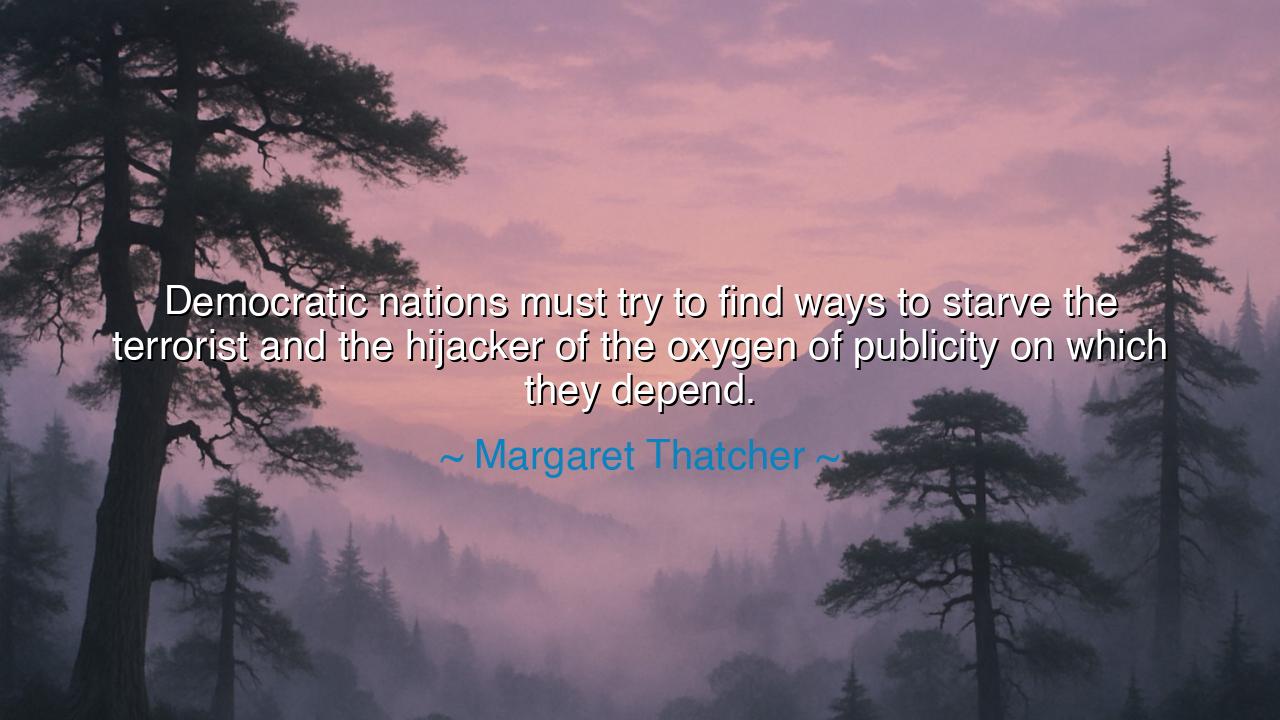
Democratic nations must try to find ways to starve the terrorist
Democratic nations must try to find ways to starve the terrorist and the hijacker of the oxygen of publicity on which they depend.






“Democratic nations must try to find ways to starve the terrorist and the hijacker of the oxygen of publicity on which they depend.” Thus spoke Margaret Thatcher, the Iron Lady of Britain, whose words rang not merely as political counsel, but as a moral warning for all ages. In this powerful metaphor, Thatcher revealed a truth that burns with the clarity of fire: that terror feeds upon attention, that violence grows when fear gives it voice, and that even the darkest deeds wither when denied the air of fame. The oxygen of publicity — this was her phrase — the breath that sustains the tyrant, the murderer, and the zealot alike. Without it, they suffocate in obscurity; with it, they thrive, expanding their shadow across nations.
The origin of this quote reaches back to the turbulent 1980s, when Britain was besieged by acts of terror — particularly those carried out by the Irish Republican Army (IRA). Thatcher, who had survived an assassination attempt by the IRA in 1984, understood the cruel genius of such violence: that it sought not only to kill, but to capture the world’s gaze. Every bomb was not merely an act of destruction, but a message — a spectacle meant to sow fear, division, and notoriety. Thus, when she declared that democracies must “starve the terrorist of publicity,” she meant that the stage of terror is sustained by the audience it gathers. If the people, the press, and the world cease to amplify the terror’s voice, its reach begins to die.
To starve evil is not merely to deny it sustenance; it is to rob it of glory. Thatcher understood that in an age of free speech and open media, the challenge for democracy is great. For freedom allows expression — even of the vile — and in that openness, darkness finds a place to spread. Yet she called upon free nations to act with discipline and wisdom: to balance liberty with responsibility, and to ensure that those who murder the innocent for spectacle do not also rule the airwaves. To her, the defense of freedom required not only soldiers and laws, but restraint — the refusal to grant infamy to those who sought it through blood.
The truth of her insight shines throughout history. When the Roman Republic was threatened by conspirators and assassins, the Senate decreed that the names of traitors be erased — their deeds denied the immortality of remembrance. Centuries later, the same pattern emerged: the anarchists of the 19th century, who hurled bombs in crowded cities, sought not conquest but headlines. And in the modern age, when acts of terror are broadcast in an instant, their power grows in proportion to their exposure. Every moment of fear shared across nations, every image repeated without thought, becomes fuel for the cause of chaos. Terrorism is theater, and every spectator strengthens the script.
But Thatcher’s wisdom is not merely about the politics of terrorism; it is about the psychology of evil itself. For evil, in all its forms — hatred, cruelty, division — thrives when it is fed by attention, by outrage, by obsession. Whether in the sphere of nations or the intimacy of human hearts, to “starve the oxygen” of such darkness is to deny it power. The wise learn to withdraw attention from that which seeks only to provoke. In silence, the flames of hatred die; in overreaction, they burn brighter. Her words thus teach not only statesmen, but souls: do not feed what seeks to consume you.
And yet, Thatcher’s warning carried a deeper paradox. For democracies, unlike tyrannies, cannot simply silence voices — even wicked ones — without endangering their own ideals. She knew this tension well. To protect liberty, one must not destroy it; to guard against terror, one must not become its mirror. Her challenge, therefore, was to urge a moral vigilance: that the people themselves — through wisdom, not censorship — learn to discern between the need to know and the lure of spectacle. The answer, she believed, lay in a free but responsible press, and in citizens strong enough not to let fear dictate their vision.
So, my children, hear this lesson and hold it in your hearts: not every evil deserves an audience. Whether in the realm of nations or in the small theaters of daily life, do not feed hatred with your attention, nor falsehood with your outrage. Choose instead to give your breath — your “oxygen” — to what is noble, truthful, and good. For where you turn your gaze, there grows your power. If the world looks only upon destruction, destruction multiplies; but if it looks upon courage, compassion, and peace, these too will flourish.
Thus, the wisdom of Margaret Thatcher stands as an eternal flame in the darkness: evil hungers for attention — do not feed it. The power of democracy, like the power of the soul, lies not only in freedom, but in discernment. Be mindful of where you give your breath, for that which you breathe life into will, in turn, shape the world you inherit.






AAdministratorAdministrator
Welcome, honored guests. Please leave a comment, we will respond soon